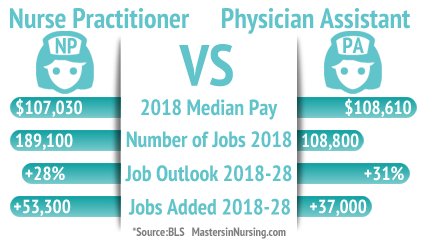The main difference between nurse practitioners (NPs) and physician assistants (PAs) is that NPs are able to provide a wider range of care and services than PAs. Nurse practitioners are able to diagnose and treat patients, while PAs are only able to provide diagnostic and treatment services under the supervision of a licensed physician.
Nurse practitioners are able to prescribe medications in all 50 states, while PAs are only able to prescribe medications in some states. Nurse practitioners also have a wider scope of practice than PAs, meaning they are able to provide more services to patients.
Nurse practitioners are able to provide primary care services, while PAs are not.Primary care services include, but are not limited to, diagnosing and treating common illnesses, ordering and interpreting diagnostic tests, and providing preventive care services.
Nurse practitioners are also able to specialize in a particular area of medicine, while PAs are not. Common areas of specialization for nurse practitioners include family medicine, pediatrics, women’s health, and mental health.
The main difference between nurse practitioners and physician assistants is that nurse practitioners are able to provide a wider range of care and services than physician assistants.
What are the educational requirements for each profession?
Nurse practitioners (NPs) and physician assistants (PAs) are two types of advanced practice registered nurses (APRNs). Both NPs and PAs are trained to provide high-quality, patient-centered care. They work in a variety of settings, including hospitals, clinics, and private practices.
NPs must complete a master’s or doctoral degree in nursing, as well as a national certification exam. PAs must complete a bachelor’s degree and pass a national certification exam. In some states, PAs may also need to complete a postgraduate residency program.
Both NPs and PAs are in high demand, and the job outlook for both professions is very positive. NPs and PAs can expect to earn a comfortable salary and enjoy job security in the coming years.
What are the scope of practice for each profession?
The scope of practice for nurse practitioners (NPs) and physician assistants (PAs) is determined by the state in which they practice. The American Association of Nurse Practitioners (AANP) and the National Commission on Certification of Physician Assistants (NCCPA) have developed position statements that outline the specific roles and responsibilities of NPs and PAs.
NPs are licensed independent practitioners who are educated and trained to provide a wide range of health care services, including the diagnosis and treatment of illness, ordering and interpreting diagnostic tests, and prescribing medications. NPs are certified by national organizations such as the AANP or the American Nurses Credentialing Center (ANCC).
PAs are licensed health care providers who work under the supervision of a physician. PAs are educated and trained to provide a wide range of health care services, including the diagnosis and treatment of illness, ordering and interpreting diagnostic tests, and prescribing medications. PAs are certified by the NCCPA.
The scope of practice for NPs and PAs varies from state to state. In some states, NPs and PAs have full practice authority, meaning they can practice independently without physician supervision. In other states, NPs and PAs must practice under the supervision of a physician.
The AANP and the NCCPA have developed position statements that outline the specific roles and responsibilities of NPs and PAs. These position statements can be found on the websites of the AANP and the NCCPA.
What are the similarities and differences between the two professions?
There are many similarities and differences between nurse practitioners (NPs) and physician assistants (PAs). Both NPs and PAs are health care providers who work closely with physicians and other health care providers. Both NPs and PAs provide direct patient care and often work in primary care settings.
NPs are registered nurses (RNs) who have completed advanced education and training beyond their RN licensure. NPs must complete a graduate-level NP program and pass a national certification exam. In most states, NPs must also complete a certain number of clinical hours. NPs can provide a wide range of services, including taking medical histories, ordering and interpreting diagnostic tests, prescribing medications, and providing patient education.
PAs are health care providers who have completed a PA program and passed a national certification exam. PAs work under the supervision of a physician and often provide care to patients in primary care settings. PAs can provide a wide range of services, including taking medical histories, ordering and interpreting diagnostic tests, prescribing medications, and providing patient education.
There are several similarities between NPs and PAs. Both NPs and PAs are health care providers who work closely with physicians and other health care providers. Both NPs and PAs provide direct patient care and often work in primary care settings. Both NPs and PAs take medical histories, order and interpret diagnostic tests, prescribe medications, and provide patient education.
There are also several differences between NPs and PAs. NPs are RNs who have completed advanced education and training beyond their RN licensure. NPs must complete a graduate-level NP program and pass a national certification exam. In most states, NPs must also complete a certain number of clinical hours. PAs are health care providers who have completed a PA program and passed a national certification exam. PAs work under the supervision of a physician.

